The process of installing PVC ceilings is generally simple and straightforward: a frame is fixed around the perimeter of the covering, then the canvas is stretched, starting from the corners of the room (first the base one, then the opposite one). However, there are many nuances that should be kept in mind. Among the features that pay attention to, one of the prizes is the finishing of joints.
The subtleties of future problems begin when installing the baguette. When securing the profiles, it is necessary to try to remove roughness and sharp elements at the joining points. Any stretch fabric can tear if not treated first. Often these operations are performed using construction tape.
In the case of complex surface shapes, measurements are taken in more detail, where the corners of suspended ceilings have a standard set, no more than 4 pieces. For smooth lines, markings are placed within 20 cm, moving along a curved contour. The profiles are arranged accordingly, often filed for a smooth bend.
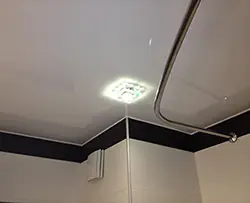
Usually, even if you measure the diagonals as accurately as possible, deviations in dimensional accuracy during cutting are possible. In this regard, it is very difficult to properly install the canvas in the outer corners. After this, wrinkles may appear that need to be removed from the profile. The most difficult thing to install is the insert where the excess film is hidden. In this regard, the insert around the perimeter will look bad. Typically, this situation is called the external corner problem. The main factor of close attention is the measurement of the future ceiling. It is usually performed by representatives of the material manufacturer. Attention is directed to determining the exact size of the sides and diagonals. In the case of the harpoon method, a small mark is placed on the outer corners of the stretch ceiling for tensioning at the fastening points. The more accurately the measurement operation is performed, the more accurately the installation of suspended ceilings will occur. Often, when delivering the material, a sheet with a drawing and definition of the base angle is included.
Sometimes during installation only the tension area may become particularly warm. This makes it possible to stretch the film in the area of the harpoon without affecting its main part. After the clamp falls into the slot intended for it, move on to the next part. If small folds appear, they are most often left undisturbed, since the canvas flattens out as it cools.
Another pitfall is waiting in the wings after the completion of the work. To hide gaps and connection lines, a decorative plug (insert) is installed.
You can purchase special skirting boards. In this case, they are processed for use on the left and right, the ends are trimmed using a chair and a hacksaw blade, and the joints are processed. In the case of rounded corners, the number of slats increases and their length decreases (usually up to 10 cm). When installing, the strips are lubricated with special glue and pressed tightly. All inconsistencies in case of deviation from 90 degrees can be removed with a regular knife. Their installation is quite simple and greatly reduces the cost of both energy and finances.
A suspended ceiling in a home is a great way to decorate the interior, but it also has practical benefits. This ceiling is easy to clean, and if something happens, the canvas can be replaced. But after installing the ceiling, clients are not always satisfied with the work of the construction workers. It happens that stripes form on the canvas, which spoil the appearance of the surface.
How to remove stripes from the ceiling
The stripe can appear on any type of stretch ceiling fabric: glossy, matte, satin.
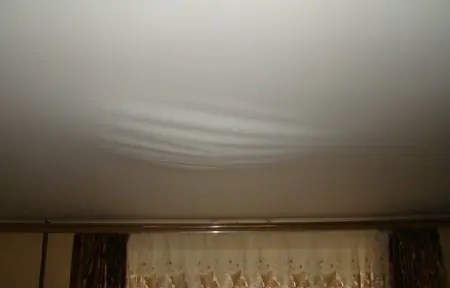
Folds on a stretch ceiling
There are several ways to get rid of such divorces:
- wait 5-6 days;
- use a hair dryer;
- increase the tension force of the material;
- replace the canvas.
Let's consider each of the options that allow you to remove stains from a stretch ceiling in more detail.
Just wait
The formation of folds on the ceiling surface after installation is not necessarily a defect. It happens that you need to wait a week or two and the creases will go away on their own - the material will acquire elasticity due to stretching.
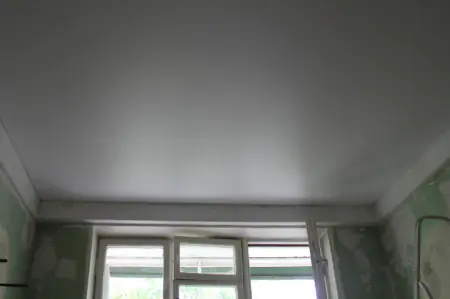
Smooth surface without creases
This process can be compared to wearing clothes - at first they are tight or tight, but gradually become looser. With a suspended ceiling and stains on it, the situation is similar. If the stripes do not disappear a long time after installation is completed, this requires drastic measures.
Using a hair dryer
The reason for the appearance of creases after installation on glossy and other types of suspended ceilings is insufficient heating during the installation process. While fixing the canvas, it is heated with a construction hairdryer. Moreover, they do this for quite a long time so that the material heats up well and becomes elastic.
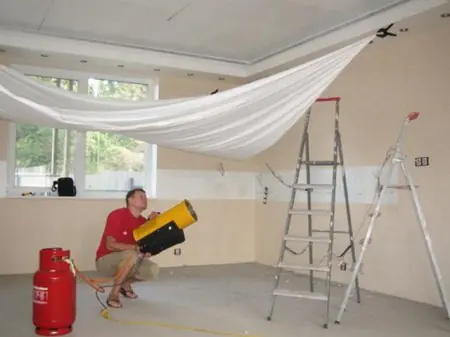
Warming up with a hair dryer to remove creases
Often such a mistake is made by amateurs who carry out installation with their own hands, without the help of professional builders. When repairing the ceiling, the hair dryer is used too little or not at all.
To correct the situation, the canvas needs to be heated with a hair dryer. You can purchase the tool at hardware stores, and you don’t have to buy it. It is better to rent a hairdryer - after all, after the ceiling correction is completed, you will no longer need it.
The fabric needs to be heated evenly, not only the area where the creases have formed, but also the surrounding part of the material. This is due to the fact that the ceiling is a single sheet, and one heated area will pull neighboring areas along with it. As a result, the entire surface will be leveled and creases will disappear.
Try using a roller while warming up to remove streaks from the canvas.
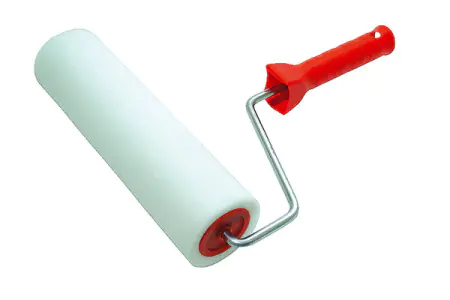
Using a roller to get rid of creases
This will allow you to quickly get rid of stains on the surface. You need to heat the surface and at the same time move a roller over it. At the end of the entire procedure, wait 1-2 hours - the stripes should disappear. If this option does not help, try increasing the tension force.
Increase tension
You can try increasing the tension force of the material. This is especially true for satin, since it is difficult to correct streaks using the heating method. But by increasing the tension, the satin will smooth out.
To increase tension, decide on the mounting method. In most cases, harpoon or wedge fastening is used.
Harpoons are hooks to which the ceiling canvas clings. During installation, the room and the surface of the material are heated, causing it to stretch. The fabric is then placed on the harpoons and the room is allowed to cool. The fabric contracts and stretches under the influence of temperature changes. This method requires precise calculations. If the ceiling area is chosen incorrectly, folds will form.
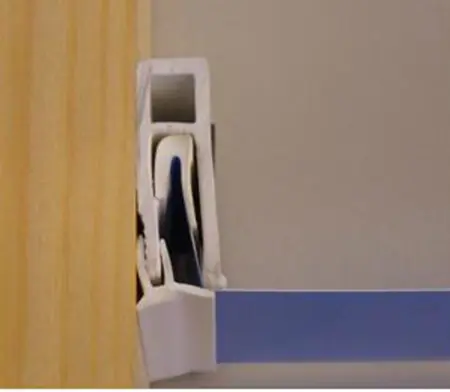
Harpoon mount
In this case, the canvas is cut along the edges, reducing its area. As a result, the tension force will increase and the streaks should disappear. To remove the stripes in this way, it is advisable to use the help of professional builders, since an independent attempt to remove the canvas and trim it can lead to its complete unusability and the need for replacement.
If you decide to do this repair yourself, then pre-heat the room and the material with a hair dryer. This makes it easier to remove the stretched surface. Then trim the satin along the edges by 2-3 centimeters.
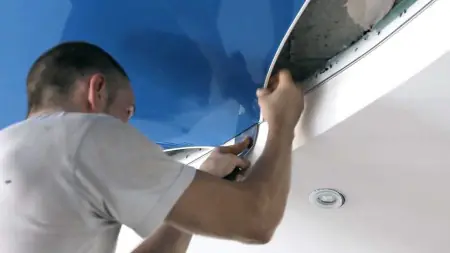
Removing the tension fabric
Important: Don't overdo it. Trimming too much will result in the fabric not being able to be secured, or it will tear during installation.
Then secure the ceiling to the hooks. You just have to wait a while, after which the ceiling should become smooth, without streaks.
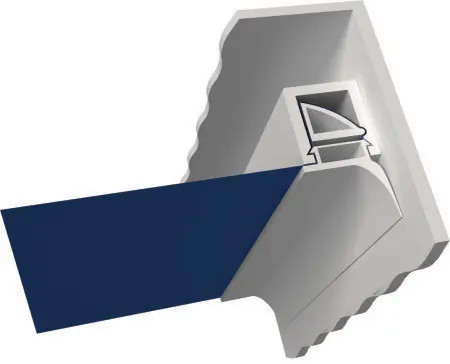
Wedge mount
If the fastening is done using a wedge method, then everything is much simpler. Then the fabric is heated, after which it is removed from the clamps and clamped a couple of centimeters further to reduce the area of the stretched surface. After which they wait for some time - the stripes that appeared after the first installation should disappear.
Replacing the canvas
If none of the options proposed above helps, then all that remains is to replace the material. Poor-quality fabrics used in manufacturing may well lead to the formation of stripes on the surface during installation.
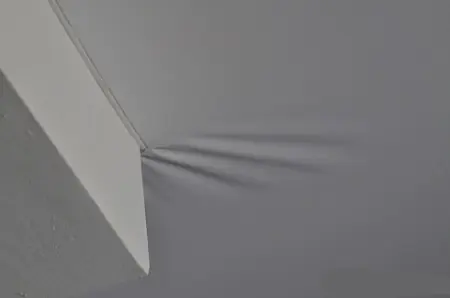
Stripes on satin
In this case, replace the ceiling completely. Use another construction company that has a good reputation for using quality products to complete the installation. Look for reviews about the construction company on the Internet or ask your friends.
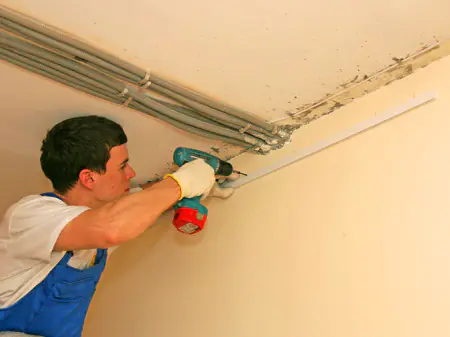
Installation of a satin ceiling
You can replace the stretch ceiling yourself. To do this, measure the surface area, then purchase the required material from a hardware store or from a company that installs suspended ceilings. In this case, it is advisable to buy the material with a reserve, since during installation unforeseen problems and unnecessary costs of material may arise.
The installation process itself is as follows: cut a rectangle from purchased fabric 5-7% smaller than the area of the room. Then heat the room with a hair dryer.
After this, the canvas is secured to the fastening devices on the ceiling, stretching it over the entire area. In this case, the material itself is heated with a hairdryer. It is better to do the work together. One person attaches the canvas to the ceiling structure, while the other heats the material with a hairdryer.
If the installation is done correctly and high-quality materials are used, then streaks, even if they appear, will disappear on their own in a few days. This applies to any type of surface: glossy, satin, etc.
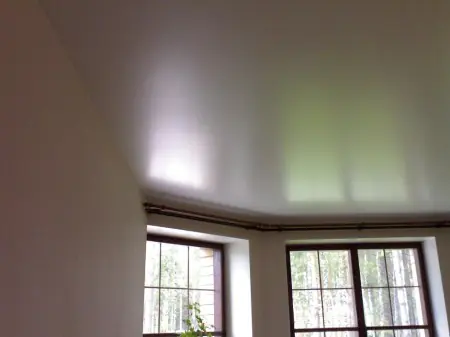
Satin stretch ceiling
These are the methods you can use to make the surface of a stretch ceiling smooth. Stripes spoil the appearance of a stretch ceiling, while a smooth surface will delight you and your guests. Therefore, do not delay in correcting this deficiency - take measures to make your home shine with beauty.
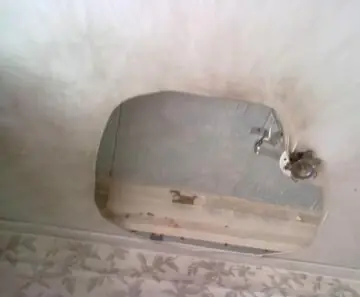
Mistakes when installing suspended ceilings - what they are and how to prevent them
A well-known saying goes like this: “The miser pays twice!” Errors when installing suspended ceilings can be expensive. In this article, I will try to talk in detail about all the “pitfalls” that may occur.
Melting the canvas
When carrying out installation work, lamps and any other heating elements must be insulated from the canvas with special thermal pads (thermal rings). They remove heat and serve as thermal insulators.
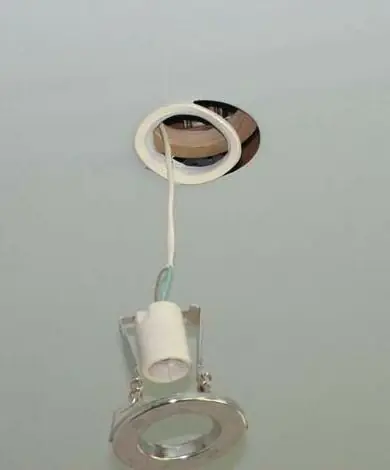
Poorly glued thermal ring
Particular care must be taken when insulating chimneys and heating devices (pipes) passing through the ceiling. Otherwise, several months after the completion of the work, the owners may notice melting of the canvas, the appearance of yellow or gray spots.
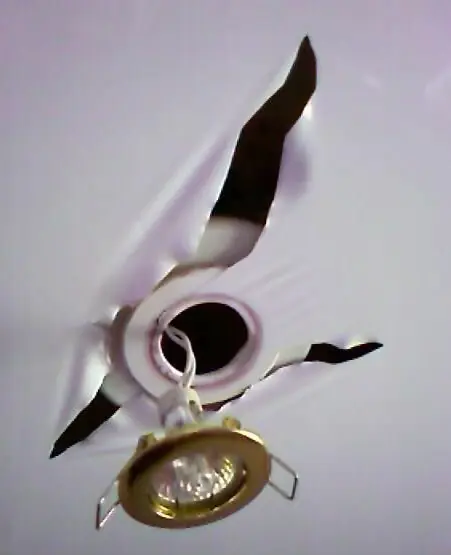
Melting and rupture of stretch ceiling
When installing the ceiling, it is unacceptable to touch the PVC material with the gun or bring the gun close. You also need to regulate the heating temperature of the canvas. PVC fabric cannot be overheated above 60-70 degrees, otherwise there will be dire consequences.
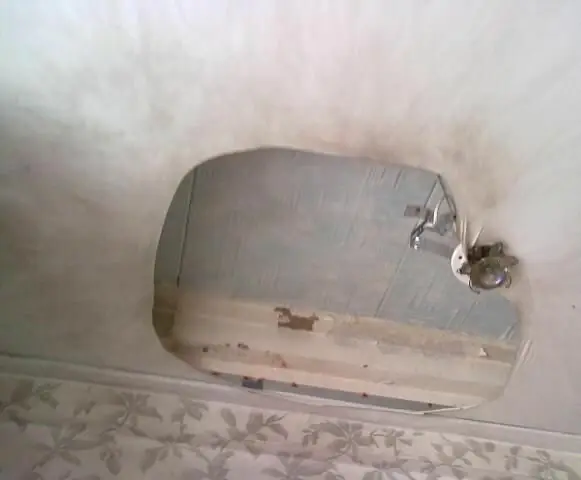
Extremely careless work with a gas gun
If you work carelessly with a gas gun, dire consequences, including fire, are possible; this is unacceptable and is the biggest mistake of suspended ceiling installers.
Lagging of the structure from walls and pipes
Curvilinear shapes and complex angles can create some difficulties when calculating and fastening the suspended ceiling frame. Carelessness in measurements and rough installation lead to the appearance of cracks and gaps, or strong folds that cannot be corrected.
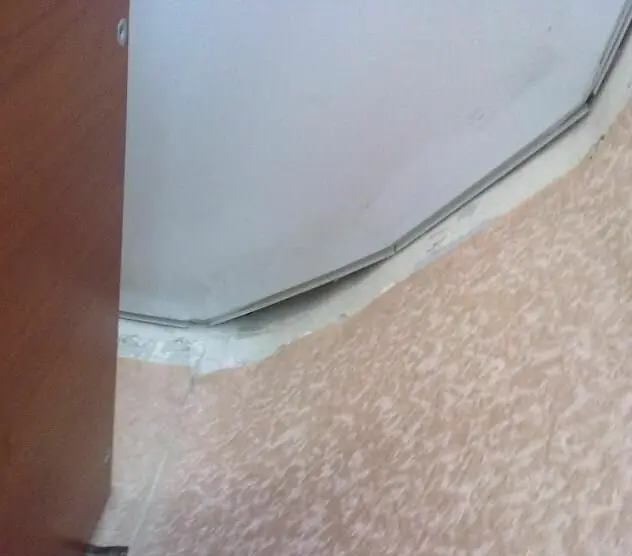
Loose fit of the baguette to the wall
If protruding corners are measured incorrectly, situations with wrinkles may also arise.
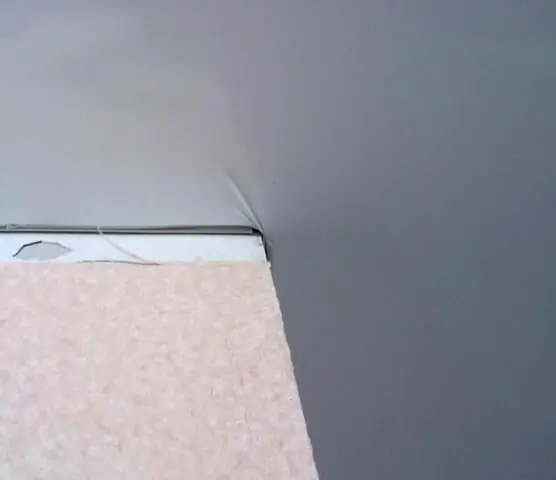
Wrinkle on outer corner
Small wrinkles can be removed from the corners if you heat the ceiling evenly and approach the outer corner. In the case of rough (large) wrinkles, it is necessary to reshape the material.
The most common mistake when installing a ceiling is wrinkles, folds, as well as gaps when circling heating pipes.
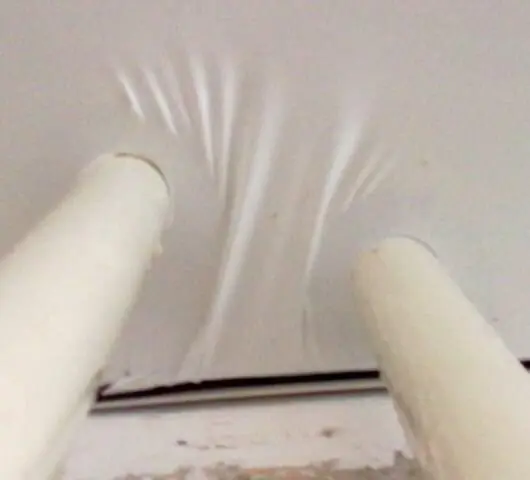
Wrinkles when bypassing heating pipes
Only well-organized measurements and experienced specialists who provide a guarantee for their work will help to avoid such situations. All frame elements must fit tightly to the surface of the walls and be securely fastened with appropriate hardware.
Sagging ceiling
Ceiling sagging may occur in a situation where flooding occurs. In this case, the resulting “bubble” can be eliminated quite simply. It is enough to drain the water through the hole for the lamp/chandelier.
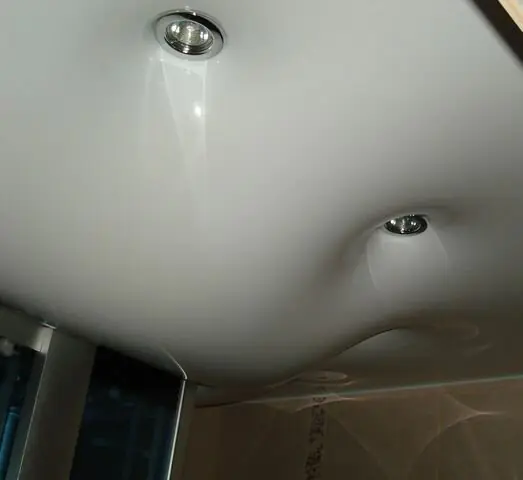
Stretch ceiling flood
Sometimes the ceiling sags even in a completely dry state due to the existing air flows between the main and suspended ceilings. This situation can be prevented in advance. To do this, you need to make sure that all the cracks in the ceiling and walls are eliminated, and that the canvas is tightly fixed in the structure and does not allow heated air to pass through it.
Wrinkles and folds
Incorrect cutting of the fabric can lead to skew and folds. This is also facilitated by uneven heating of the material during installation work. This is quite common error when installing suspended ceilings.
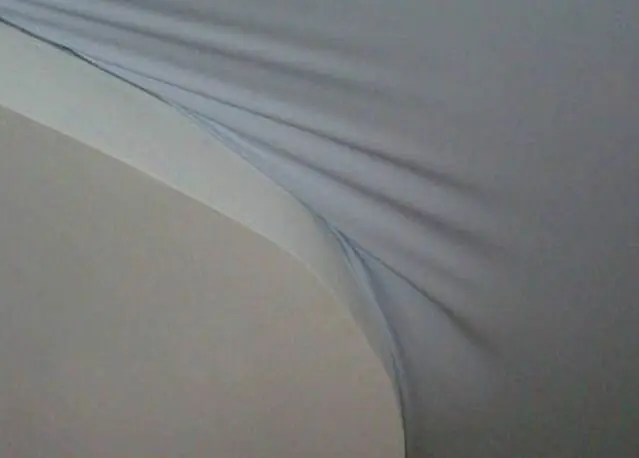
Wrinkles when installing a two-level ceiling
Competent measurements and high-quality patterns in the hands of experienced craftsmen who can predict the degree of shrinkage of the canvas will help avoid the appearance of creases, folds and wrinkles on the ceiling.
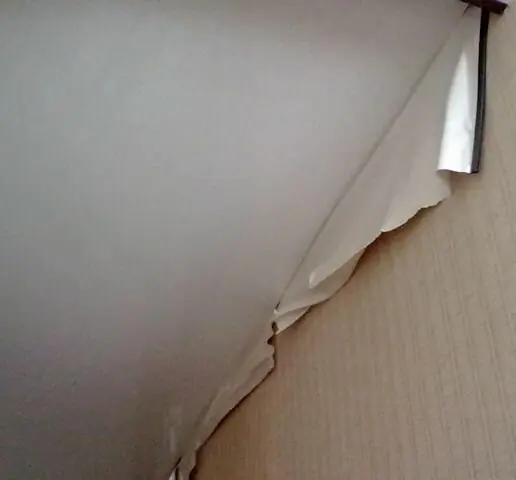
Incorrect stretch ceiling measurement
Electrical cable breakdown
When carrying out fastening work, it is necessary to drill holes in the walls and ceiling. If there is hidden wiring, it is quite possible that the drill will get into the cable. To prevent such a nuisance, it is advisable that the owner of the premises provide a diagram of the location of electrical communications. If such a diagram is not available, you can use basic search engines that help determine the passage of electrical wires and cables, and also allow you to find reinforcement in reinforced concrete structures.
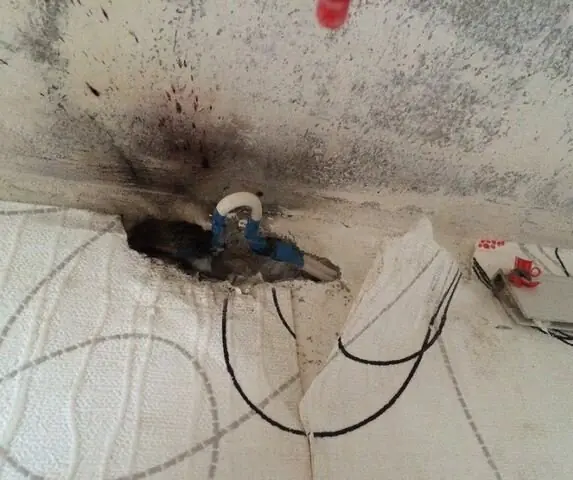
Consequences of improper repair of broken wiring
In any case, if the repair is just beginning and it is planned to replace all the wiring, it is advisable that the specialists leave a diagram of the location of electrical appliances and cables. Otherwise it is difficult to avoid such mistakes when installing suspended ceilings.
It’s even better when wiring inside the frame occurs openly in a corrugated sleeve. This will then allow repair work to be carried out without dismantling the suspended ceiling.
Sticking of the stretch ceiling to the main one
When heated air escapes through the ceiling, negative pressure is created. In this case, the canvas is pulled up to the main ceiling and fits around the fastening elements.
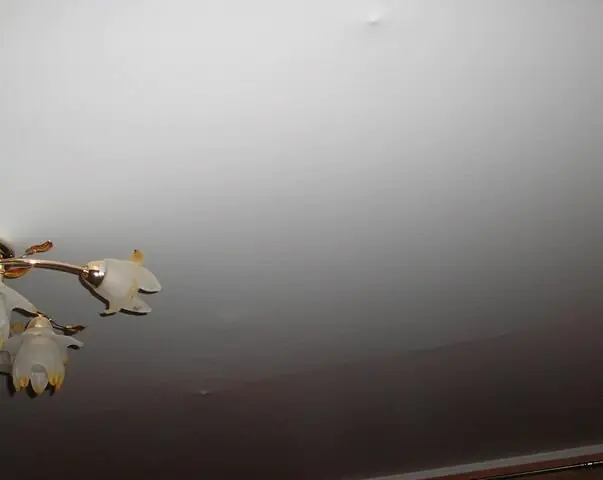
Sticking of the stretch ceiling to the main one
This problem can be solved in two ways.
- If the existing air flow is not provided for by the plan and occurs through cracks in the ceiling, it is necessary to repair the existing damage and seal the ceiling.
- When the existing flow of air from one room to another is provided and useful, installing ventilation grilles in both ceilings can solve this issue. In this case, the negative pressure will be compensated and the blade will be in the correct position.
Melting of wallpaper, drywall and plastic structures
Some workers, if they want to heat up a problem area of the canvas, may bring the heat gun too close to the surface. It should be taken into account that the temperature with which the device affects the canvas and surrounding materials from afar differs from the one obtained nearby. In any case, it is necessary to strictly observe all temperature conditions and not use heating equipment in close proximity to flammable and melting objects.
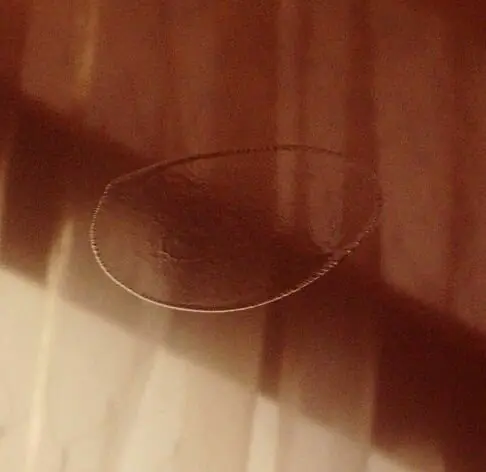
Melting stretch ceiling
Poor welding of seams
When preparing a stretch ceiling in production, mistakes can also be made.
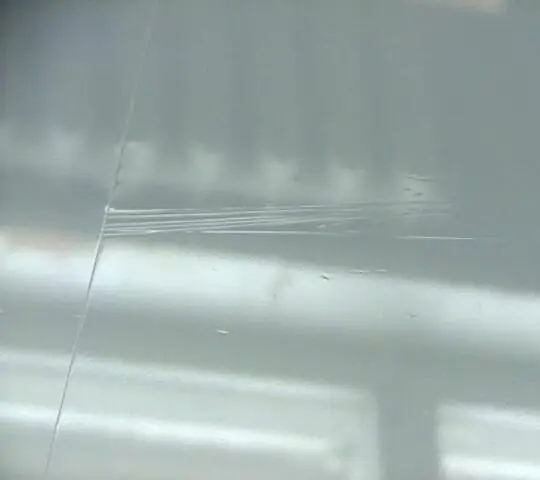
Folds on a stretch ceiling
In rare cases, the seam may rupture when stretched.
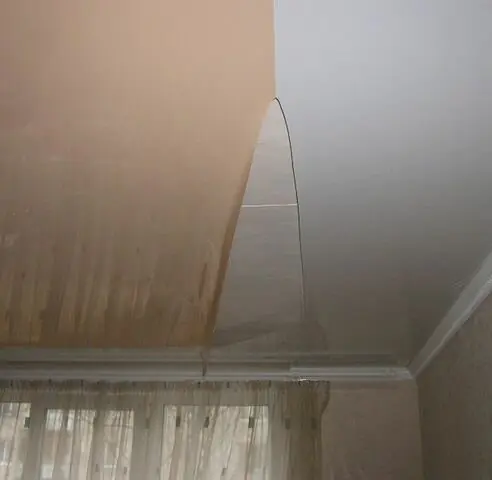
Seam rupture on a suspended ceiling
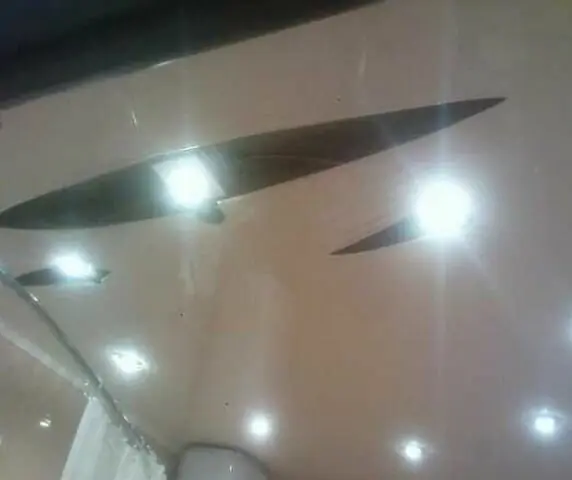
Rupture of seams on a stretch ceiling
If installation is incorrect, or rather if the ceiling is heated unevenly, wrinkles on the seams are possible.
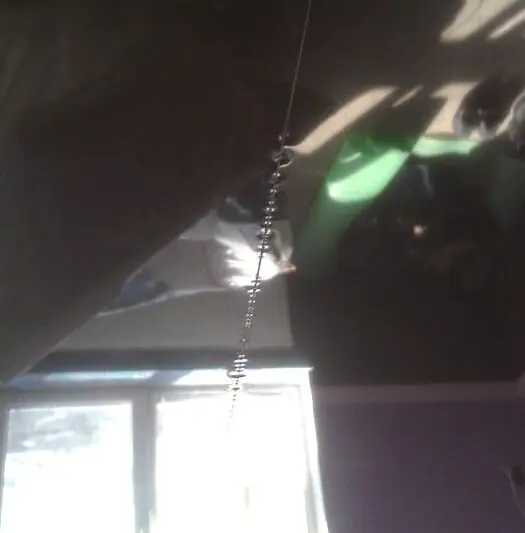
You can make hanging beauty with your own hands. If a person is just starting out, it is advisable to train in small areas. You can speed up the learning process when you have information on how to avoid mistakes when installing suspended ceilings.



